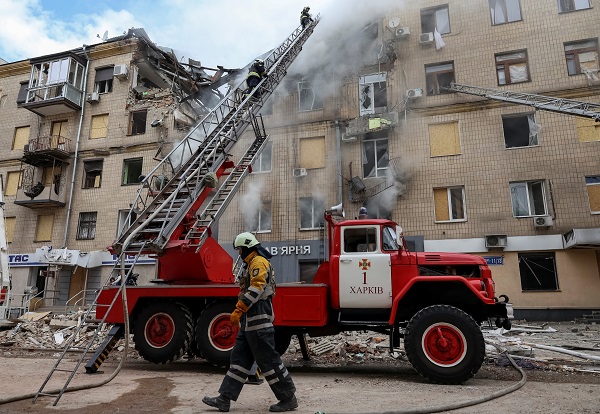 Firefighters work at the site of a residential building hit by a Russian military strike, amid Russia's attack on Ukraine, in Kharkiv, Ukraine, 6 September 2022;
Credit: Reuters / Sofiia Gatilova
Firefighters work at the site of a residential building hit by a Russian military strike, amid Russia's attack on Ukraine, in Kharkiv, Ukraine, 6 September 2022;
Credit: Reuters / Sofiia Gatilova
KYIV (Reuters) - Ukrainian forces have attacked the Russian-held eastern town of Balakliia in the Kharkiv region, a senior pro-Moscow separatist official said, as Ukrainian officials remained guarded about how a counteroffensive was faring.
Luhansk region Governor Serhiy Gaidai told Ukrainian television, without giving locations, that a "counterattack is underway and ... our forces are enjoying some success. Let's leave it at that".
Giving its regular situation report on Wednesday morning, Ukraine's military said its ground forces had attacked seven Russian command points and thirteen "objects of concentration of Russia's manpower", without saying where.
It also said its forces had repelled Russian assaults on various towns in the eastern Donetsk region, including the strategic city of Bakhmut.
A presidential adviser had tweeted earlier on Tuesday 6 September 2022 that there would be "great news" coming from the president on the operation in the northeastern Kharkiv region.
In his evening address, however, President Volodymyr Zelensky made scant mention of operations in the Kharkiv region, but he did say five Russian cruise missiles were shot down on Tuesday, most of them in the south.
Reuters was unable to independently verify the Ukrainian claims and there was no immediate response from Russia.
But an official with the pro-Moscow breakaway Donetsk People's Republic on Tuesday gave an unusually frank account of the fighting at Balakliia, an eastern town of 27,000 people that lies between Kharkiv and Russian-held Izyum, a city with a major railway hub used by Moscow to supply its forces.
"Today, the Ukrainian armed forces, after prolonged artillery preparation ... began an attack on Balakliia ... ", Daniil Bezsonov said on Telegram, adding that if the town were lost, Russian forces in Izyum would become vulnerable on their northwest flank.
"The Ukrainian armed forces concentrated mass fire on the mobile groups of the Donetsk People's Republic, which had taken up defensive positions in nearby forests", he continued. "At this time, Balakliia is in operative encirclement and within the firing range of Ukrainian artillery. All approaches are cut off by fire".
Several posts on social media from military bloggers and witnesses also reported fighting around Balakliia.
Vadym Krokhmal, member of the town council of Kupyansk, a town east of Kharkiv that has been occupied for the past five months, posted a video online urging residents not to take part in any referendum on joining Russia that occupying forces might stage.
"Very soon, the Ukrainian armed forces will liberate Kupyansk. We know this, we are certain of this," Mr Krokhmal said, advising people to stock up on food and charge power sources. "All we need is a little patience".
Little information has emerged about progress of the main Ukrainian offensive in the southern Kherson region, with Kyiv barring journalists from the front line and releasing only limited reports to preserve the element of surprise.
Russia says it has repelled the Kherson assault, but Ukraine has reported steady success.
"We are pursuing positional battles and there are already areas that we have liberated", Natalya Humenyuk, a spokesperson for the south district of the Ukrainian armed forces, told national television according to media reports.
A statement by the south district command said that in the past 24 hours, Ukrainian forces had killed 83 Russian servicemen, destroyed five tanks, twelve howitzers, three armoured vehicles and three ammunition depots. It also said anti-aircraft fire had downed a Russian Su-25 attack aircraft.
Western military experts say Ukraine's aim in the south appears to be to trap thousands of Russian troops on the west bank of the wide Dnipro River and cut them off by destroying their rear supply lines.
The announcement of a simultaneous Ukrainian advance near Kharkiv was an indication that Russian troops were having difficulty reinforcing along the front, Mark Hertling, a retired former United States (US) commander of ground forces in Europe, said in a tweet.
Nuclear plant safety
United Nations (UN) Secretary-General Antonio Guterres laid out specific steps for both sides to demilitarise the area around the Russian-held Zaporizhzhia nuclear power plant in southern Ukraine.
The first was for Russian and Ukrainian forces to commit to refraining from military activity in and around the plant, Europe's biggest nuclear power station.
"As a second step, an agreement on a demilitarised perimeter should be secured", Mr Guterres told the UN Security Council on Tuesday. "Specifically, that would include a commitment by Russian forces to withdraw all military personnel and equipment from that perimeter and a commitment by Ukrainian forces not to move into it".
Russia's UN Ambassador Vassily Nebenzia told reporters ahead of the council meeting, "if we demilitarise then the Ukrainians will immediately step in and ruin the whole thing".
Russian soldiers were defending the station, Mr Nebenzia said.
International Atomic Energy Agency (IAEA) inspectors led by the agency's chief, Rafael Grossi, braved shelling to cross the front line and reach the power station last week. Two experts from the UN nuclear watchdog have stayed on to maintain a long-term presence.
A long-awaited IAEA report released on Tuesday listed damaged parts of the plant, including a building housing nuclear fuel, a facility for storing radioactive waste, and a building housing an alarm system. It said the power station had been cut off several times from offsite power supplies critical to its safe operation.
The report avoided blaming either side for the damage. The plant was seized by Russian forces shortly after their invasion of Ukraine on 24 February 2022, but is still run by Ukrainian technicians. It sits on a Russian-held bank of a huge reservoir, opposite Ukrainian positions across the water.








